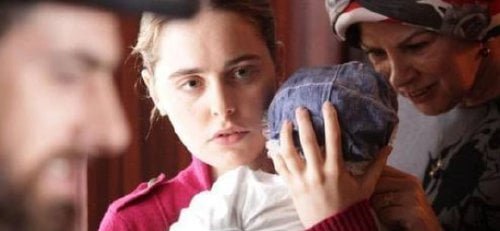Fill the Void

Eighteen year-old Shira (Hadas Yaron, winner of Best Actress at the Venice Film Festival) and her family are celebrating Purim, a stream of visitors arriving to partake in a celebratory meal, some looking for financial assistance from her father, Aharon (Chayim Sharir). News of a newly arranged marriage causes joy among the women and Shira is happy that her own wedding is on the horizon. But when her elder sister Esther (Renana Raz), heavily pregnant with her first child, collapses and later dies in childbirth, the onus is placed on Shira to "Fill the Void."
Laura's Review: B+
Israel's submission for the 2012 Foreign Language Academy Award is from first time feature writer/director Rama Burshtein. It is a subtle, elegant movie that brings us into the structured world of Tel Aviv's ultra-Orthodox Hasidic community to show how one young woman navigates the demands of her religion and her family's expectations without losing herself in the process. It helps to know that Purim is a Jewish holiday in which they celebrate their deliverance from death by a Persian King by Mordecai and his Queen Esther, as Shira's sister is Esther and her widowed husband Yochay (Yiftach Klein) names their son Mordecai. Immediately following Esther's burial, the family head to synagogue for Mordecai's bris which cinematographer Asaf Sudry ("Beaufort") presents completely in overhead shots, a God's-eye point of view. This voiceless child drives the remaining narrative. Life resumes some semblance of normality. Shira visits a school, plays accordion and receives belated sympathies. But then her mother, Rivka (Irit Sheleg), learns that there has been a marriage offer to Yochay from a Belgian widow and she is so distraught about the idea of her grandchild being taken away, she calls in the local matchmaker Shtreicher (Michael David Weigl) to engineer her son-in-law's marriage to his sister-in-law. Shira is then informed that the family to whom she was already promised has pulled out of the arrangement. Shira must traverse intricate emotional mindfields, including her own. Her affectionate Aunt Hanna (Razia Israeli), who never married because of a disability, encourages Shira to do what is right for herself, putting her at odds with Rivka. Her older unwed cousin Frieda (Hila Feldman) says it was Esther's wish that she marry Yochay should anything happen to her. And when Shira does decide to acquiesce, the Rabbi (Melech Thal) senses a lack of truth and refuses to go ahead. How Burshtein resolves all these conflicting agendas is simply beautiful, and yet her final image is anything but conclusive. Yaron is exquisite here, a girl yearning for womanhood who is unsettled by the prospect of an older man, her sister's husband. The delicate dance between her and costar Klein suggests much with few words spoken - the reconsideration of a known quantity, virginity vs. experience, an uncomfortable incestuousness butting heads with sexual tension. Sudry doesn't move his camera much, instead composing widescreen shots that define character dynamics. Closeups highlight facial expression in shallow focus against rich black backgrounds. Music is integral, from the rock music pounding in the distance as the family gather around the door separating them from the unconscious Esther to Yitzhak Azulay's score, weaving in and out with religious songs and the accordion music played by Shira. "Fill the Void" is a quiet film, its tensions mostly bubbling beneath its surface, but it's all the more compelling for just that reason, the way we lean in closer to hear those who whisper. It has moments of laughter and even of outright comedy, but what it leaves us with is the exquisite grace of one young woman.

